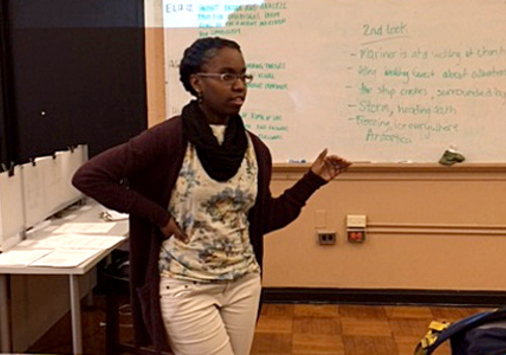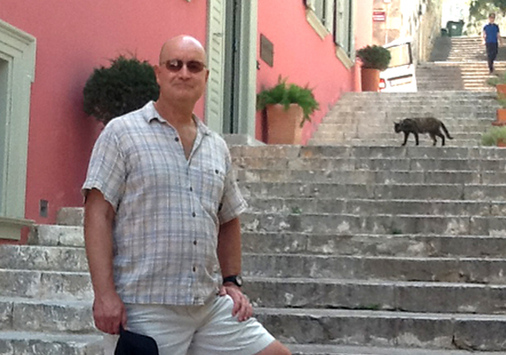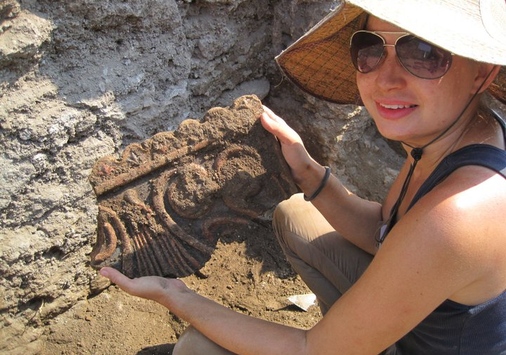Courses
2024 - 2025
For this academic year's course catalog, please visit our Academic Catalog site. For courses currently offered, please refer to the Schedule of Classes.
This is an introductory course in the history and culture of ancient Greece and Rome, focusing on particular topics relating to classical culture, and emphasizing the analysis of textual and material evidence.
This course is an introduction to Ancient Greek literature from the Homeric world to the Hellenistic era. Students will read the works of major authors representing a variety of genres from epic poetry to philosophical dialogues, considered in the contexts of both ancient culture and contemporary society.
In this course students will study the literature of ancient Rome, analyzing texts not only for their importance to the development of Latin literature but also for their subsequent influence on later authors, from the Renaissance to the modern world. Readings will include selections from the genres of comic drama, lyric, elegy, epic and satire.
This course is a study of the mythology of classical antiquity, with an emphasis on its representations in literature and art, and its relationship to the practice and rituals of Greek and Roman religion.
An overview of the major cultures of the ancient Mediterranean from 1700 BCE to 300 BCE focusing on the Ancient Greeks and Persians. The course begins with the prehistory of each of these cultures and their predecessors/contemporaries in the Aegean, including peoples known as the Minoans, Mycenaeans, Hittites, Phoenicians, Assyrians, Egyptians (Kemet), and Kushites, and examines the development of ancient Hellenic and Iranian cultures from the 8th-3rd centuries BCE in connection with each other and these other cultures. Ancient Greek and Persian cultures were Mediterranean phenomena that spread in antiquity from the Aegean through southern Europe, the Black Sea, and Egypt as far as India and have had lasting influence in Europe, Asia, and North Africa and were in almost every period deeply intertwined. The course focuses on the major social and political institutions as well as the intellectual and artistic achievements of the Greeks and Persians.
A survey of Roman civilization from both an historical and cultural perspective. Chronologically, the course traces the development of the "eternal city" from a tiny village of mud and straw along the banks of the Tiber River in central Italy to the city of marble and bronze dominating the Mediterranean world and beyond. Culturally, we consider Rome's legacy to the western world in terms of its social and political institutions, as well as its intellectual and artistic achievements.
This course explores the visual and material cultures of the ancient Greek world from the 15th century BCE through the the 1st century BCE. Since art, architecture, and artifacts are the material expression of culture and what determines culture, we must interpret these objects in their socio-historical contexts.
This course traces the development of Roman visual and material culture from the Archaic through Late Antique periods, exploring how material objects and visual imagery both shaped and were shaped by different social groups and cultural identities. The course balances a critical analysis of iconic elite monuments and famous works of Roman art with the objects, images, and spaces of sub-elite groups.
This course provides a survey of ancient epic tales written by the Greeks, Romans, Mesopotamians and other ancient cultures. Students analyze various epics and situate them within their social, cultural, historical, and literary contexts. They also examine ancient and modern artistic representations of these epics and their relationship to their literary counterparts. In addition, students consider the topics and themes found in these ancient epic tales in relation to our own cultural experiences and conflicts today.
This course explores rhetoric and methods of persuasive speaking in ancient Greece and Rome. Students analyze ancient Greek and Roman speeches, situate them within their cultural context, learn techniques for effective public speaking and argumentation, and compose and deliver speeches tailored to a variety of situations.
This course focuses on the dramatic arts as practiced in Ancient Greece and Rome. Students read selected plays, tragic or comic, by the major playwrights of Greco-Roman antiquity, giving attention to dramaturgy, societal contexts, and influences on the development of Western theater.
This is a seminar course on a particular historical, social, or cultural topic related to the study of the ancient Mediterranean world.
This course explores how power and status worked in the family, in politics, labor practices, and religious institutions during classical antiquity, focusing on the intersections of gender, class, ethnicity, and sexuality.
This course considers the various ways the Greeks and Romans speculated about and defined human differences, as well as exploring the ways in which the ancients theorized about and manipulated their environments to achieve a desired identity. Attention is also given to how these theories were received from medieval to modern times.
This course provides a survey of magic and witchcraft in ancient Greece and Rome. Students engage with issues such as how magic works, how people interact with the divine, the marginalization of magical practitioners, and the difference between magic, witchcraft, and religion. Emphasized topics include magicians, witches, ghosts, spirits, demons, divination, and spells.
This course surveys the art of healing in ancient Greece, and how it manifested in theory and practice. Students study the activities of individual healers (doctors, midwives, pharmacists, temple attendants), the nature and function of spaces dedicated to healing (cult sanctuaries, doctors’ homes), and the experience of patients. Students also engage the ancient concepts of health and illness, ideas about public health, and the ways Greek writers used disease as a metaphor for social breakdown and political violence.
This course examines the ancient and modern importance of the legendary city of Troy, the site of the mythical Trojan War. The course begins with the epic poems of Homer (Iliad and Odyssey) and engages with the archaeological history of the site as well as selected novels, poems, and films that respond to and re-envision the ancient stories of the famous conflict and its characters.
Alexander of Macedon ('the Great') led his armies from ancient Macedonia into Africa and across the continent of Asia changing the political and cultural landscape for centuries to come. What emerged after Alexander is often called the Hellenistic world, a multicultural world of both Greek and indigenous kingdoms marked by a fusion of Greek and local cultures. This course explores Alexander and his legacy through examination or the literary and material evidence.
This course focuses on the ancient Mediterranean in the Roman imperial period (approx. 25 BCE-400 CE). It explores the political, social, and cultural contexts for the empire and the material remains throughout Europe, Africa, and Asia that reflect the extent of Rome’s influence.
This course explores the various permutations of ancient Athenian democracy and law. The democracy of ancient Athens is often considered the "First Democracy". Although this is not accurate, it has been one of the most influential democracies in history. In the course, students examine the history, structures, and legacy of the Athenian democracy, its conception of citizenship, and the development of its courts.
This course examines Roman law and society through the Roman law of delict (wrongful harm to persons and property punished through private law, roughly equivalent to torts in Anglo-American common law). Through the careful discussion of cases (case-study method), we will learn about the nature of law and legal thinking, how it worked (or didn’t), and how legal practice reflected and shaped ethical, economic, and social ideas.
An introduction to the Roman legal system and its relationship to Roman society through the study of Roman family law. Through the careful study of cases, jurists’ commentary, and common law comparisons, students learn about Roman culture and history while developing the ability to examine legal rules and assess them critically.
Evidence from ancient Rome suggests that a sophisticated retail system developed in urban centers during the Republic so that by the Early Imperial period, many Roman towns were characterized by busy commercial streets and districts where people consumed time and space alongside ready-made goods and services. The shop became a place of leisure and a locus of sociability where status and identity were forged, negotiated, and performed. It also became a potentially subversive space where information was exchanged, and status and power could be challenged and temporarily overturned. This course explores the questions of where, how, and why ancient Romans shopped. focusing on such important aspects as: distribution networks, the evolution of the retail trade, Roman attitudes toward various forms of retailing, analysis of commercial art and architecture, evidence for marketing strategies, shopping behaviors, and consumption practices.
A one-credit senior capstone seminar to support students in writing their senior research. The capstone is team-taught by the department faculty and focuses on discipline-specific: methods and approaches (literary, historical, archaeological) for analysis of ancient evidence; citational practices for ancient evidence; databases and other tools for conducting research in Greco-Roman antiquity; and group workshops at various stages of the thesis-writing process.
Ancient Greek Minor
2024 - 2025
For this academic year's course catalog, please visit our Academic Catalog site. For courses currently offered, please refer to the Schedule of Classes.
An introduction to the fundamental morphology and syntax of ancient Greek. Exercises in grammar and translation are based primarily upon quotations from Greek literature and the New Testament.
Advanced study of ancient Greek grammar and language. Emphasis is given to the development of translation skills by reading extended passages of Greek.
Prerequisite(s): GRK 111.
A general category used only in the evaluation of transfer credit.
Readings from ancient Greek that help students transmission from the first year focus on grammar to learning to read and analyze more advanced authors in the original ancient Greek.
Prerequisite(s): GRK 112 or consent of instructor.
Latin Minor
2024 - 2025
For this academic year's course catalog, please visit our Academic Catalog site. For courses currently offered, please refer to the Schedule of Classes.
An introduction to the fundamental morphology and syntax of Latin. Exercises in grammar and translation are based primarily upon quotations from Latin literature.
An introduction to advanced grammar and the idiomatic language of Latin. Emphasis is given to the development of translation skills by reading extended passages of Latin.
Prerequisite(s): LAT 111 or consent.
A general category used only in the evaluation of transfer credit.
This course transitions students from either the first year Latin sequence or from high school Latin into reading and analyzing advance Latin authors. It also introduces students to the study of Latin stylistics through composition.
Prerequisite(s): LAT 112, placement, or consent of instructor.









